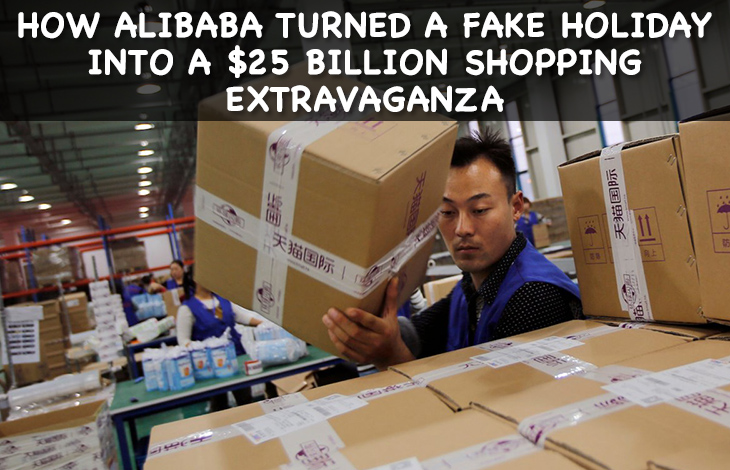How Alibaba Turned A Fake Holiday Into A $25 Billion Shopping Extravaganza

Alibaba recorded a whopping $25 billion in revenue in just a 24 – hour period on November 11th, 2017 following an unofficial holiday in China known as Singles’ Day. Just to give one perspective on just how staggering an amount this is, this figure alone is more than the total online US sales from Cyber Monday as well as Black Friday.
Singles’ Day
Singles’ day is a popular Chinese unofficial holiday celebrated on 11th November. The actual name of the holiday is ‘Single Sticks’ day which refers to single people; on this day young people in China take pride in being single.The date was specifically chosen since the initials 11/11 consist of the number ‘1’: – a singular unit. Singles’ day started out as Bachelor’s Day in Nanjing University in 1993. The story goes that 4 bachelors in the dorms of the university agreed that they would celebrate their singleness. These activities spread throughout the entire institution and eventually the general public. The introduction of social media further increased the day’s popularity and has cemented itself within contemporary Chinese culture.
But how is such a day led to such a massive amount of sales on Alibaba?
The answer lies in the China’s social structure and population. The country implemented a one-child policy between 1978 and 1980. The intention of the policy was to curb the country’s problem of overpopulation. Keep in mind that the Chinese have a culture in which the male child is destined to inherit the family wealth as well as the family business. They were also poised to get better jobs and were generally more successful. Consequently, the Chinese considered male children as ‘more important’ than female children. The policy then led to a huge gender imbalance within China. Studies show that men will outnumber women by at least 30 million in 2020. This massive imbalance led to the popularization of Singles’ Day.
A second factor to consider was the shopping habits of the Chinese. Shopping increased significantly in late September, the period right before China’s National day. Secondly, shopping increased significantly in the first two months of the year as well; this is the period right before the Spring Festival. This presented a period of low activity right in between the two retail poles in which young people, who are much savvier with online shopping, would celebrate an unofficial day which they created themselves.

How did Alibaba take advantage?
The company offered deep price cuts in their products. This paid off immensely as company enjoyed record high sales. Other companies noticed Alibaba’s success, so much so that in the following years other Chinese retailers joined the bandwagon. In 2015, Black Friday and Cyber Monday sales totalled US$6 billion whereas Singles’ Day sales totalled US$14.3 billion. In 2016, Cyber Monday and Black Friday sales totalled US$6.8 billion whereas Singles’ Day sales totalled US$17.8 billion.
Alibaba’s stock has seen a massive increase of about 19% over the past month. This is promising for local investors as well investors engaged in international share trading. This stock is particularly useful for investors employing a growth strategy. This is even more impressive considering the trade war between US and China that has an adverse effect on global stock prices. Investors mostly depend on fundamental analysis when making decisions regarding investing in a stock. What this entails is analysing the financial health of a company in terms of their growth potential, their leverage levels as well as their liquidity. Consequently, these trade wars have had a negative effect on the growth potential of companies as well as the overall stability of the financial markets.
Read More:
- The Goldman Sachs Group, Inc. Latest Earnings Report
- Talk of Australia’s Housing Bubble Being About to Pop
<script type=”application/ld+json”>
{
“@context”:”http://schema.org”,
“@type”:”Article”,
“author”:{“@type”:”Person”,
“name”:”Varun Rana”},
“dateModified”:”2019-07-04T02:23:00+10:00″,
“datePublished”:”2019-01-11T01:02:00+10:00″,
“description”:”Alibaba recorded a whopping $25 billion in revenue in just a 24 – hour period on November 11th, 2017 following an unofficial holiday in China known as Singles’ Day. Just to give one perspective on just how staggering an amount this is, this figure alone is more than the total online US sales from Cyber Monday as well as Black Friday.”,
“headline”:”How Alibaba Turned A Fake Holiday Into A $25 Billion Shopping Extravaganza”,
“image”:{“@type”:”ImageObject”,
“height”:470,
“url”:”https://expertzine.com.au/wp-content/uploads/2019/01/How-Alibaba-turned-a-fake-holiday-into-a-25-billion-shopping-extravaganza-1.jpg”,
“width”:730},
“keywords”:”Alibaba”,
“mainEntityOfPage”:{“@id”:”https://expertzine.com.au/how-alibaba-turned-a-fake-holiday-into-a-25-billion-shopping-extravaganza/”,
“@type”:”WebPage”},
“publisher”:{“@type”:”Organization”,
“logo”:{“@type”:”ImageObject”,
“height”:”512″,
“url”:”https://expertzine.com.au/wp-content/uploads/2017/02/cropped-Zine.jpg”,
“width”:”512″},
“name”:”Expertzine”},
“isAccessibleForFree”:true,
“hasPart”:{“@type”:”WebPageElement”,
“isAccessibleForFree”:true}
}
</script>






